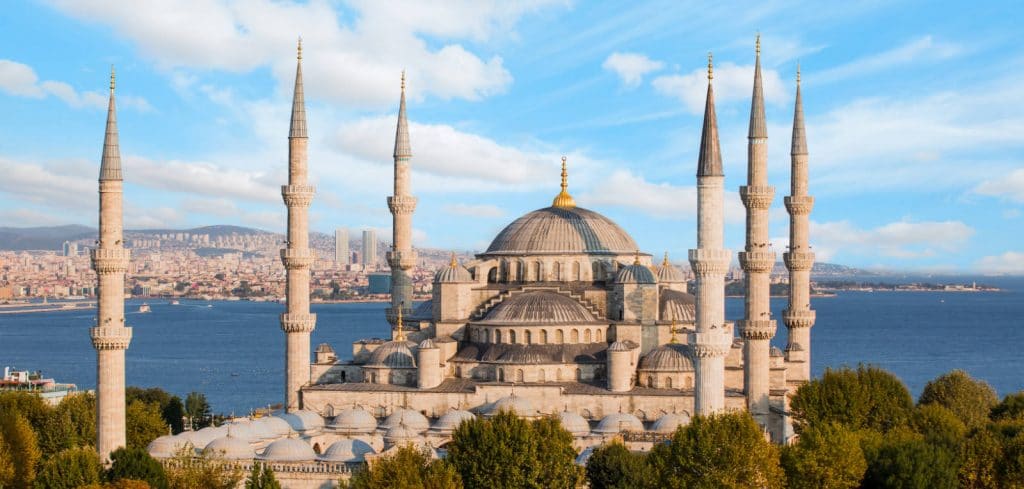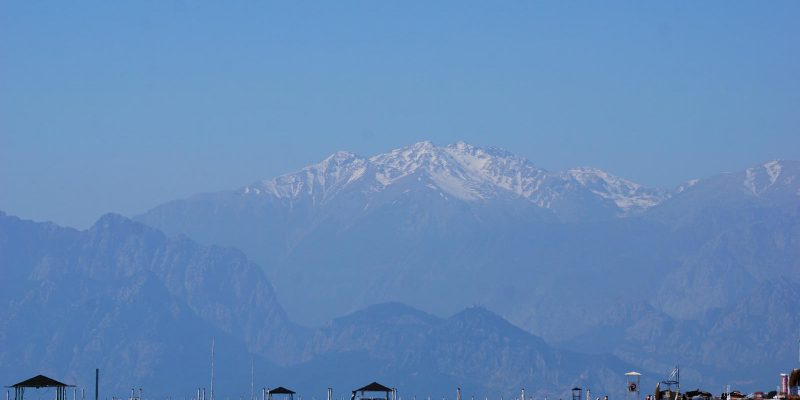Turkey is a country that bridges two continents. It offers travelers a unique blend of cultural diversity, historical richness and breathtaking natural beauty. A vacation in Turkey promises not only a journey through fascinating landscapes and ancient cities, but also a deep immersion into a culture that has been shaped by millennia.
Turkey is a travel destination that is geographically at home on two continents. Anatolia, the Asian part, takes up around 97% of the country’s territory. In the north-west is the European part, where the capital Istanbul is located.

T
Turkey is home to some of the oldest civilizations in the world. From the ruins of Troy to the magnificent Topkapi Palace in Istanbul, the country is a living museum that tells the stories of Romans, Byzantines and Ottomans. Every corner of Turkey, from Ephesus to Cappadocia, offers unique insights into the past.
Vacationers will not only be interested in the numerous UNESCO World Heritage Sites but also in the beautiful nature reserves. The white limestone terraces of Pamukkale, the surreal rock formations of Cappadocia, the pristine beaches along the Aegean and the Mediterranean and the majestic mountains of Eastern Anatolia are just a few examples of the country’s beauty.
Bathing holidaymakers in particular love the 7200 kilometers of coastline with its beaches. In some regions, tourist strongholds have developed over the years, characterized by a large number of luxurious hotels.
Turkish cuisine is a feast for the senses and reflects the diversity of the country. From hearty kebabs and fresh mezze to sweet delicacies such as baklava, Turkish gastronomy offers a range of flavors to satisfy every palate. Each region has its own specialties to discover.
Discover Turkey – a country that has more to offer with every visit. Hike in the Taurus Mountains, sail along the Turkish Riviera or explore ancient ruins. Enjoy the lively cultural scene in cities such as Istanbul and Izmir, or relax in one of the many luxurious resorts. Enjoy your vacation!
Discover vacation destinations

Antalya, a vibrant metropolis in Turkey, is much more than just the capital of the province of the same name. It is considered the jewel of the Turkish Riviera, surrounded by impressive mountain ranges and the azure Mediterranean Sea.
Vacation in Turkey: Information
Arrival
By Airplane
With Turkish Airlines and Pegasus you can get from many cities in Central Europe to their bases at the two Istanbul airports. This way you can reach most of the bigger cities in Turkey with a change of planes.
There are many daily non-stop scheduled flights from many German cities to Ankara, Antalya, Istanbul or Izmir.
By train
By train there are only connections with multiple changes. The Bosphorus Express from Bucharest to Istanbul operates only in summer.
From the direction of Austria, it is possible to reach Istanbul by car train from Villach in a scheduled time of 32 hours, but only in the season.
The train connections from Greece have been discontinued for several years.
By bus
The international long-distance bus network to Turkey is excellently developed.
By car
The journey to Turkey via the Balkan route is unproblematic. Visa and Carnet are not required.
Attention. At peak travel times, the road border crossings of the “guest worker route” are heavily congested, waiting times of several hours can occur.
By ship
From Ukraine Ukrferry sails to Istanbul-Haydarpasa and seasonally to Samsun.
A passenger ferry connects Istanbul with Burgas in Bulgaria in summer.
From Taşucu, the port of Silifke, there is at least one ship a day all year round to Northern Cyprus.
There are regular connections between several Greek islands and the nearby Turkish mainland.
Entry regulations
German and Liechtenstein, Swiss and Luxembourg citizens can enter the country with an identity card or passport. For tourists, a stay of 90 days within a period of 180 days is possible without a visa.
If the entry is from a country that is not a member state of the Council of Europe, a passport must be presented.
Passports must still contain at least one blank page.
For children, a separate identity document is required.
Austrians need a passport and an eVisa entry permit, which can be purchased at airport kiosks or in advance online.
On the way in ...
By plane
Between the larger cities there are air connections at reasonable prices.
Rental car
Driving a rental car in Turkey is unproblematic. The requirements of the rental car companies are different, but at the latest with 21 years you get a car everywhere.
The national driving license is sufficient.
Permitted speeds:
- Car and motorcycle: town 50 km/h
- Car: country road 90 km/h
- Motorcycle: country road 70 km/h
- Car: freeway 120 km/h
- Motorcycle: Motorway 80 km/h
Traffic offenses are expensive!
Prices for gasoline and diesel are significantly higher than in Germany.
By train
The situation for rail travelers has improved in recent decades. Modern and clean vehicles are now used on numerous routes. In addition, the first new lines are in operation, on which trains travel at speeds of up to 250 kilometers per hour.
Rail fares are cheaper than bus fares.
By bus
Within Turkey, even small towns are easily accessible by bus.
If you travel as a couple or a group, you should buy the tickets together, otherwise the seats are separated by gender.
The buses leave on time at fixed times and are in most cases neat and clean.
Dolmuş/Collector Taxis
Shared cabs are a convenient and inexpensive means of local transportation. They are very heavily used by locals as well and offer little in the way of comfort. Stops are usually marked with a large D (for “Durak,” stop). A ride is inexpensive.
Toll
Most highways no longer have toll booths. Instead, they have lanes that automatically scan for the RFID stickers (HGS) on the window. HGS stickers can be purchased at service buildings at major toll plazas, post offices PTT, at highway rest stops and at some Shell gas stations.
Best time to travel to Turkey
Spring (March to May)
Spring is one of the best times to visit Turkey, with mild temperatures and fewer crowds. Average temperatures vary between 11°C and 25°C, depending on the region.
Summer (June to August):
Summer is peak season for tourist regions, especially on the coasts. It can get very hot, especially inland. Average temperatures can rise to 30°C or higher in the south and west. Slightly milder in Istanbul and along the Aegean coast. It rains very rarely, especially in the coastal regions.
Autumn (September to November):
Average temperatures range between 15°C and 25°C, depending on the region. The number of rainy days increases in November in particular.
Winter (December to February)
In winter it is milder in the coastal regions, but in the interior and east it can get very cold, with snow in the mountain regions. Average temperatures on the coast can be around 10°C, inland and to the east much colder. The ski season begins in the mountain regions such as Uludağ and the eastern Pontic Mountains.
There are a few regional peculiarities to note:
Aegean and Mediterranean coast: Hot, dry summers and mild, humid winters. Ideal for summer vacations.
Central Anatolia: Continental climate with hot summers and cold, snowy winters. Spring and fall are mild and pleasant.
Black Sea coast: Temperate climate with high rainfall all year round. Relatively cool summers and mild winters.
Eastern Anatolia: Harsh winters with lots of snow and very cold temperatures; short, warm summers.
Language
The national language is Turkish. Other languages spoken are Kurdish and Arabic.
In the tourist centers it is often no problem to communicate with English or German. Russian is also spoken in some regions.
Outside the tourist centers, communication is often only possible in the national language.
Power Plug
In Turkey, the type F sockets are used. The mains voltage is 220 V at a frequency of 50 Hz.